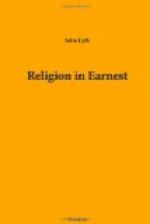But the soul of her joy, and its fulness
she drew
From the source of all others
the best;
For she trusted in Him, who is faithful
and true,
She delighted in God, and
was blest.
Then, why should we weep at the thought
she is gone,
Since we know she hath enter’d
her rest?
No! her children will follow, united as
one,
In her steps to the home of
the blest,
J.L.
XXIV.
PLEASANT MEMORIES.
“THE MEMORY OF THE JUST IS BLESSED,” Prov. x. 7.
Although the preceding pages will enable the reader to form a general estimate of Mrs. Lyth’s religious character, the writer deems it necessary to add a concluding sketch, partly for the purpose of recording some particulars which could not so well be introduced elsewhere, and partly to supplement his own remarks, which might otherwise be liable to the charge of partiality, with a selection from the numerous testimonies with which he has been favoured by Ministers and other friends.
In person Mrs. Lyth was of middle stature, slender, and, before years had subdued her physical strength, straight as an arrow. Her complexion was fair, and her features, rather pointed than full, were regular and well formed. The eyes, of light blue, generally wore a calm and gentle expression, but kindled with an unearthly light when conversing on divine subjects. Then her whole soul flashed in her countenance, and her features, lit as with sunshine, indicated how deeply her spirit had drank of that “stream which maketh glad the city of God.” Her hair, which in youth was of a rich auburn, turned grey at the early age of thirty, and at length its silvery hue was superseded by a snowy white, which gave additional impressiveness to a countenance upon which happiness, purity and peace sat continually enthroned. Her dress, the perfection of neatness, was modelled after the most approved style of the Society of Friends, not as now, modified and robbed of its interest by all-powerful fashion, but as it existed in its original simplicity fifty years ago. Though not gifted with any remarkable powers of mind, she possessed a sound and vigorous understanding, which however, was rather quick than penetrating. This she improved by a considerable amount of good reading. Her choice of books was in harmony with the set purpose of her life, and seldom surpassed the bounds of religious literature: for while she had no sympathy with those little minds that, on the pretence of greater religiousness despise human knowledge, she steadily kept in view the rule she adopted in early life, “never to trifle with any book with which she had no immediate concern,” and consequently preferred those which, while they informed the judgment, were also calculated to impress the heart. Within this limit her reading was widely varied. To the better class of biography, she added poetry, history, philosophy, and divinity.




